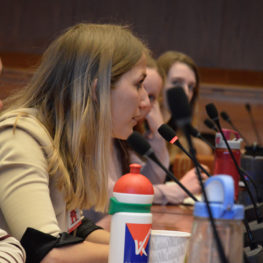Albert-Ludwigs-Universität Freiburg
| Location | Freiburg, Germany’s solar city, is located at the foot of the Black Forest very close to France and Switzerland. The town is surrounded by an impressive landscape, with snow-covered mountaintops in winter and Mediterranean-type vegetation in the nearby Rhine Valley. Freiburg is a traditional yet dynamic university town and one of the most beautiful and attractive cities in Germany. It has a population of about 200,000 inhabitants. |
| Course focus | Sustainable development and accordingly sustainability in the mani- fold relationships between humans and the environment have become integral rules of conduct in politics and society. This is also true in economics, where for many companies a commitment to the principles of sustainability has become a central strategic competitive advantage.
One of the major challenges to the implementation of the overall concept of sustainable development concerns effective governance processes between various stakeholders regarding the wise use of environmental resources within companies, administrations, organisations, and society at large. The M.Sc. Programme ‘Environmental Governance’ (MEG) addresses this special need. Unique worldwide, its focus is on facilitating the institutionalisation of context-effective environmental governance arrangements that combine the regulation of market, state and civil society for sustainable development. The study programme comprises:
The programme does not limit itself to a special regional context but focuses on environmental governance processes in a representative, worldwide perspective from local to international level. |
| Target group | The MEG Programme is targeting future leaders in the complex field of sustainable development. ‘Sustainability designers’ possessing grand, innovative ideas about environmental governance arrangements transcending the traditional functional, structural and territorial boundaries. ‘Sustainability managers’ embracing and understanding these ideas and capable of finding ways to implement them in a con- text-sensitive manner. |
| Course language | English |
| Entry requirements |
|
| Degree Awarded | Master of Science (M.Sc.) |
| Course Begins | Beginning of October every year |
| Course Duration | 24 months |
| Course Structure | Module Handbook 2019 |
| Duration of German language course prior to beginning of programme | 2 months (for students awarded a DAAD-scholarship) |
| Remarks | An internship of seven weeks is required during the course. The programme is accredited by ACQUIN in accordance with international standards. |



